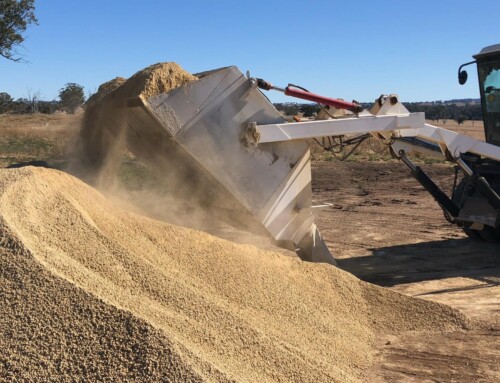Here are five key benefits of gypsum application:
1. Source of calcium and sulfur for plant nutrition. Plants are becoming more deficient for sulfur and mot soil are not supplying it. Gypsum is an excellent and cheap source of sulfur for plant nutrition and improving crop yield.
2. Improves soil structure. Flocculation, or aggregation, is needed to give favorable soil structure for root growth and air and water movement. Clay dispersion and collapse of structure at the soil-air interface is a major contributor to crust formation. Gypsum has been used for many years to improve aggregation and inhibit or overcome dispersion in sodic soils. Soluble calcium enhances soil aggregation and porosity to improve water infiltration. This is important to manage the calcium status of the soil, just like managing NPK levels.In soils having unfavorable calcium-magnesium ratios, gypsum can create a more favorable ratio. The addition of soluble calcium can overcome the dispersion effects of magnesium or sodium ions and help promote flocculation and structure development in dispersed soils.
3. Improves water infiltration. Gypsum also improves the ability of soil to drain and not become waterlogged due to a combination of high sodium, swelling clay and excess water. When gypsum is applied to the soil, it allows water to move into the soil and allow the crop to grow well.Increased water-use efficiency of crops is extremely important during a drought and with the increased costs of irrigation water and power bills. Better soil structure allows all the positive benefits of soil-water relations to occur and gypsum helps to create and support good soil structure properties.
4. Gypsum improves water infiltration rates into soils and also hydraulic conductivity of the soil. It is protection against excess water run-off from especially large storms that are accompanied with erosion. Helps reduce runoff and erosion. Agriculture is considered to be one of the major contributors to water quality, with phosphorus runoff the biggest concern. Experts explained how gypsum helps to keep phosphorus and other nutrients from leaving farm fields. Gypsum should be considered as a Best Management Practice for reducing soluble P losses.
5. Improves acid soils and treats aluminum toxicity. Gypsum has the ability to reduce aluminum toxicity, which often accompanies soil acidity, particularly in subsoils. Gypsum can improve some acid soils (sodic soils) even beyond what lime can do for them, which makes it possible to have deeper rooting with resulting benefits to the crops. Top dressed gypsum leaches down to to the subsoil and results in increased root growth. Gypsum can also increase the effectiveness of liming when treating acid soils.









